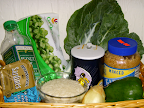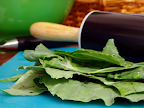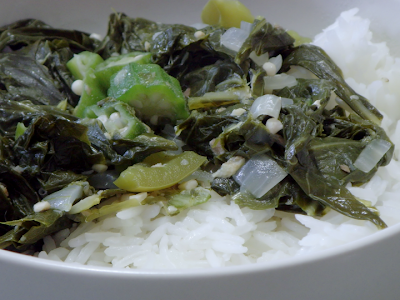Background
The background research for this breakfast was very difficult but had an elegant solution in the end. Cookbooks about the Democratic Republic of Congo or Zaire were not easily found. The next step on our search was to find cuisine of the dominant ethnic group of the country. This ethnic group is the Bantu and they are widespread through out sub-Saharan Africa. As a result I found a very comprehensive site about Somali Bantu which I stashed away for future reference.
The elegant solution came via my mother who reminded me that a good friend had lived near the DRC border studying gorillas for a year. I phoned Ayres and he recommended saka-saka. The recipe is from an African recipe site called The Congo Cookbook. I had come a across it before but I was unaware it was eaten for breakfast. In Africa the leaf would be a cassava leaf and would freshly picked form the plant. We chose to use collard greens as recommended by the website. We served the saka-saka on jasmine rice.
Saka-Saka
- 1 bunch of collard greens
- 2 tbsp peanut oil
- 1 onion chopped
- 1 clove garlic minced
- 1 bell pepper chopped
- 1/2 lb chopped okra
- can of sardines
- salt to taste

- Tear the leaves into pieces and throw out the stemmy parts of the leaf.
- Soften the leaves with a rolling pin.
- Bring 4 cups of water to a boil, add the leaves, and simmer for 30 minutes uncovered.
- Add the remaining ingredients to the pot and cook down the water.
- Serve on a bed of jasmine rice.
This breakfast was simple once the research was done. The major mistake we made was buying a fresh packing of sardines. They had very little salt in them and so the final dish was a little bland. This problem was quickly remedied with a salt shaker. Another problem that I added far to much water at the beginning and it took a long time to cook off. The 4 cups given in the recipe is my guess at what should be an appropriate amount of water to cook the greens and have the breakfast ready in a timely fashion.
 An alternative method of mashing the leaves involves a bowl, a bottle, and bashing. We chose the rolling pin method because we live in an apartment and bashing the leaves early in the morning would be rude to the neighbors. It does sound much more fun than a rolling so somebody try it and let us know.
An alternative method of mashing the leaves involves a bowl, a bottle, and bashing. We chose the rolling pin method because we live in an apartment and bashing the leaves early in the morning would be rude to the neighbors. It does sound much more fun than a rolling so somebody try it and let us know.

That is truly exotic - but is there a big difference between bashed and unbashed collard greens?
ReplyDeleteWhit says no, other than contributing to the eventual heat-death of the universe.
ReplyDelete